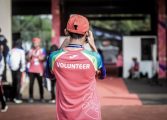By Page H. Gifford
Correspondent
Former Fluvanna resident and son of Barbara and Michael Carey Sr. recently received the Raymond Gavins Distinguished Faculty Award for his working as an associate professor at Duke University. It’s been a long haul with many obstacles but a worthwhile journey for Michael Carey Jr. Choosing a career in nursing, a profession dominated by women, and being an African-American man had its challenges.
More than receiving an award or reaching his personal goals, the journey began with his parents. Barbara and Michael were the first to attend the all-white schools due to voluntary integration. Barbara attended Fork Union Elementary School in sixth grade and Michael Sr. attended the Fluvanna County High School in eighth grade.
“Our parents and grandparents felt that we could benefit from integration to get a better education,” said Barbara. Barbara and Michael Sr. had two sons but her son, Adrian passed in 2019 due to heart complications. He worked two jobs and completed his Bachelor of Science degree and worked in the IT field.
“Michael Sr. and I often think about what he could have accomplished. We know that God gave Adrian the ultimate gift of eternal life in glory with him. It is so hard, but we have to trust in the Lord,” she said. “Parents expect their children to be successful in life. We did not expect anything less for both of our sons. As children, they went through their ups and downs like most kids. When they became young men, they learned important values in life; that was so rewarding to see.”
Barbara said she noticed that Michael Jr’s abilities and accomplishments as early as third grade, citing his competitive nature academically and in sports.
“Michael developed an attitude of “I can do.” If you tell him he cannot do something, he will find a way to prove you wrong.” She recalled when he would go to Virginia Power recreational field in Bremo (it’s called Dominion now), to practice his 3-point shots for hours, day after day. During a division game, he made the 3-point shot to give Fluvanna the victory.
“When he attended JMU, one of his professors gave him a B on one of his presentations. He was so upset because he said he deserved an A. The professor later used Michael’s presentation as a guide for other students to follow. That made him stronger. When he was at UVA, a professor told him he would not make it in the PhD program. Again, he proved them wrong and continued to make great accomplishments. His attitude was and still is if you tell him what he cannot do, he is more determined to show you what he can do.”
Michael said “his path to nursing was entirely unexpected.” Shortly after graduating with a Bachelor of Science Degree in health services administration from James Madison University, he began working in the regional office of a large health insurance company as a quality consultant. He was primarily responsible for overseeing a financial incentives program (bonus payments based on quality and utilization measures) for primary care providers in their regional market. Two years later, due to company restructuring, many positions including Michael’s were eliminated.
“Certainly I didn’t anticipate such a major life change so early on in my career, so naturally I had no ‘plan B’. Consequently, I began thinking about the next steps,” he said. His department chair, a former Registered Nurse (RN), suggested nursing school. “He was a relatively young Philipino man who mentored me through this period of change. He demonstrated an amazing knowledge of the healthcare system and I eagerly absorbed every bit of advice he shared. It was clear that clinical training, coupled with my health services background, would be a particularly powerful and unique skill-set.” With that in mind, Michael enrolled in an Accelerated Bachelor of Nursing (second degree) program at the University of Virginia (UVA).
Near the end of his ABSN program at UVA, the faculty coordinating clinical practicum for students issued a program-wide announcement that individuals who desired hands-on managerial experience as well as clinical training, would have the opportunity to do so at a nearby long-term care facility.
“Given my career interests, I jumped at the opportunity. It was during this fateful experience that I found my passion for gerontological nursing – caring for older adults and their families.” After completing his clinical practicum and graduating from the ABSN program at UVA, he worked in a post-acute rehabilitation and long-term care facility as a staff nurse. “To my surprise, I often found myself caring for the entire census of 35 to 52 post-acute and chronically ill older adults. Because of the volume of older adults and inadequate staffing levels, it was nearly impossible to be everywhere I was needed and patient care was often delayed. Even with my first degree and experience in health administration, I knew I needed additional training.” This led Michael to enroll and complete the requirements for his Master of Science in Nursing (MSN) and doctorate (PhD) in Nursing Science degrees at UVA. Once again through determination and hard work, he not only proved the nay-sayers wrong but continued his journey on a path he felt was right for him and to serve others.
“Through the support and encouragement of parents and mentors, I recognized early on in the PhD program at UVA that I was being prepared to become a scientist and leader in reshaping health care delivery.” He collaborated with distinguished faculty, participated in NIH-funded health services research projects, and learned how to conduct data analyses that support planning, program development, and evaluation in efforts to improve patient outcomes among underserved and aging populations. “A common theme among these experiences was the goal of advancing nursing knowledge and serving humankind through a standard trilogy – research, teaching, and service – all staples of being a scientist and educator in nursing, which was appealing to me.”
Before graduating from the PhD program, Carey Jr. interviewed at several schools of nursing but ultimately decided to begin his academic career at the Duke University School of Nursing (DUSON).
“As a faculty member at the DUSON, I believe I am impacting the next generation of nurses in two distinct ways. First, as a scientist, I investigate healthcare problems and generate evidence that is clinically relevant to informing the care of older adults and their families,” he said. “Being one of the few PhD prepared African-American males in nursing in the U.S, I enjoy mentoring junior faculty from underrepresented racial/ethnic backgrounds in research and writing for publication. Second, as an educator, I have the opportunity to teach courses designed to help students gain specialized knowledge for planning, managing, and evaluating nursing care delivered to older adults experiencing acute and chronic health problems.”
He said it has not been easy but recognizes that he shares the same thoughts and feelings as others of color trying to reach higher levels in the nursing field.
“Going through nursing school at the University of Virginia and now as a faculty member at Duke University, both predominately white institutions, was a very difficult and isolating experience for me,” he said. “Unfortunately, many students of color continue to feel disconnected during the nursing programs. More than ever before, we need nursing programs that value diversity, inclusivity, and a sense of belonging. Concerted efforts are needed to recruit and retain faculty from underrepresented racial/ethnic backgrounds.”
He cited a recent report by the American Association of Colleges of Nursing, stating black Americans make up 13 percent of the U.S. population, but only 11 percent of bachelor-level nursing students, 10 percent of RNs, and 9 percent of academic nurse educators. The trend looks bleak but with educators, researchers, and nurses like Carey Jr, anything is possible.
His mother says her grandchildren are aware of Carey Jr’s hard work and sacrifices and they are the next generation growing up in Fluvanna to watch.
“He is a true example that if you get knocked down, you just get back up stronger and better. Do not let people determine your destiny and tell you what you cannot do. Michael always wrote down quotes and scriptures for motivation and of course, he always put God first in his life.” She added that Michael is a true example of a young African-American man working hard to exceed expectations to reach success and remain humble.




